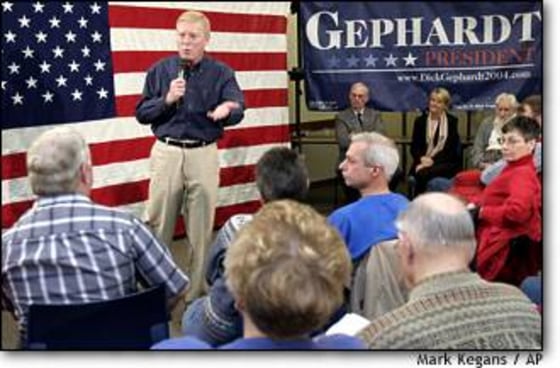Democratic presidential contender Dick Gephardt was on a mission Sunday to convince Iowa Democrats that his support for the Iraq war is not only right but that staying in Iraq is absolutely essential to defending the United States. In campaign stops in western Iowa, Gephardt made the case for continued American involvement in Iraq just as eloquently and passionately as President Bush has in recent days.

“IF WE WALK out, we are going to have a terrorist training camp that will make Afghanistan look like a Sunday school picnic,” Gephardt heatedly told a crowd in Sioux City Sunday. “And if we want to have unending terrorism, here and across the world, then we just walk out and leave it in a total chaotic mess. … If we leave, the terrorists win and we are in big trouble. We have got to see this through.”
As Bush does in many of his statements, Gephardt melds the threat from Saddam loyalists in Iraq with the threat from al-Qaida.
The conventional wisdom holds that here in Iowa — traditionally a dovish state — Democrats who take part in the first-in-the nation caucuses on Jan. 19 will punish presidential contenders such as Gephardt who voted for the war resolution last year and the $87 billion in continued funding that Congress OK’d last month.
Gephardt’s assertive advocacy of the U.S. commitment in Iraq seems counterintuitive. Whether it is political bravery or foolhardiness will only be determined when the 60,000 or more Democrats choose delegates in precincts across the state on the evening of Jan 19.
Gephardt told MSNBC.com Sunday that he is not hearing from most rank-and-file Democrats in Iowa that the United States should withdraw its forces from Iraq.
“Most people believe we’ve got to see this through, but most people believe he (President Bush) is failing us because he is not getting help,” the Missouri congressman said.
With American soldiers dying almost every day, Gephardt’s pro-war profile seems especially risky since he is now in the battle of his life with former Vermont Gov. Howard Dean here in Iowa.
Gephardt is 7 percentage points ahead of Dean in the most recent Iowa poll, but Dean’s forces are energized by his opposition to the war.
And to be sure, Gephardt blasted Bush’s handling of the Iraq operation in his campaign stops Sunday.

“I’ve served with five presidents — he’s by far the worst,” he told a crowd of 50 people in Sioux City Sunday. “The more time you spend with him, the more you’re convinced he should not be president of the United States.”
Assessing the Iraq operation, he said, “It’s costing a billion dollars a week. We lost 16 people yesterday. We’re losing two or three people a day and he still hasn’t gotten the help that we need. This is a failure.”
Gephardt contended that the United States could and should persuade the United Nations to take over the job of reconstructing Iraq while getting France, Germany and Russia to contribute troops to maintain order.
No matter how pointed his critique of Bush, Gephardt still agrees with the president on the necessity of prevailing in Iraq and the Dean campaign has seized on this. In a flier mailed to Iowa voters this week, Dean said that as Democratic leader in the House of Representatives, “Gephardt quickly cooperated in approving the White House’s war resolution — dashing the hopes of Democratic legislators and American citizens seeking further debate and examination of the disastrous new doctrine justifying pre-emptive war.”
Gephardt struck back Sunday. “Howard said he would not politicize the war issue,” he told reporters. “He said he was for the $87 billion appropriation and, in 1997 he said in an appearance that he thought Iraq had weapons of mass destruction. “
Gephardt questioned whether Dean’s current criticism of the war was consistent with his previous views.
And there is something more personal in Gephardt’s approach to the issues of war and terrorism.
He seems deeply chastened by the terrorist attacks of Sept. 11. His extemporaneous remarks took on an air of a confession Sunday.
“Nine-eleven was the ultimate wake-up call,” he said as he reeled off previous al-Qaida attacks on the World Trade Center in 1993, on U.S. embassies in Africa and on the USS Cole, “none of us took it seriously enough. We didn’t do what we should have done.”
He describes his meeting with the families of some of those killed on Sept. 11 as “a bad meeting” — a harrowing experience as widows “sobbed uncontrollably” as they showed Gephardt photos of their dead husbands.
But on Sunday, Gephardt was forced to confront testy questions from rank-and-file Democrats who demanded to know why he backed the war in Iraq.
“Why have you not been more outspoken about what has transpired in Iraq?” one man demanded during the question-and-answer period after his speech in Sioux City.
As Gephardt explained his position, a somber voice in the crowd interrupted him, “Know that we’re not going to tolerate another Vietnam.”
“I understand that,” Gephardt replied. But he added, “I cannot in conscience say to our young people who are over there getting shot at that we’re backing up on them. … And I’m also not going to send the wrong signal to the people in Iraq. They’re watching everything we do. The Baathhists are trying to take the place back over.”
HIS OWN RESEARCH
He also sought to persuade the doubters by explaining, “I didn’t take Bush’s word for whether or not they had weapons of mass destruction in Iraq. I went to the CIA. I sat down across from George Tenet. I said, ‘George, I have to vote, you don’t. Are you worried that they have weapons or the components of weapons or the ability to quickly make weapons?’ He said ‘yes’ emphatically. I got the same thing from high officials in the Clinton administration who had worked in the security area.”
In his battle with Dean, Gephardt seems to be contrasting his sober and solidly Midwestern style with that of the former Vermont governor. Poking fun at his own squareness even as he celebrated it, Gephardt always introduced himself and his wife as “Dick and Jane” — as in the children’s primer.
Gephardt’s speech to the Jefferson-Jackson fund-raising dinner in Des Moines on Saturday night was a low-keyed, even lackluster recital of his campaign agenda. But in the morning-after light of Sunday, it seemed that maybe Gephardt had deliberately chosen his Midwestern phlegmatic manner to Dean’s superheated rhetoric at the dinner.
“You have the power to take back this party and make it stand for something again!” Dean declared, before ending his speech by shouting 14 times in a row, “You have the power!”
A MATTER OF ROOTS
Gephardt also invokes his working-class roots, a contrast to Dean’s upper-crust upbringing as a stockbroker’s son who attended an elite Rhode Island prep school.
Where Dean is “cocky,” according to one Sioux City Democrat who turned out to hear Gephardt, Gephardt portrays himself as unassuming. He tells crowds that his mother repeatedly admonished him as a boy: “Be humble — you deserve to be.”
The war is far from being the only issue Gephardt addressed on the Iowa campaign trial this weekend. He was almost as passionate about the use of low-cost foreign labor to undercut American wages. Workers in China and Mexico, he told Iowa audiences, “live in worse conditions than most farm animals do in Iowa.”
And he insisted — despite recent encouraging economic data — that “the economy is a mess.” He contended that “7 percent growth in one quarter does not a good economy make. It’s no reason to believe this thing is going to sustain itself. … Even with 7 percent growth, we’re still losing jobs.”
But it is Iraq that inspires Gephardt to his most intense rhetoric these days and it is the war that will play a large, perhaps decisive, role in determining whether he wins the Iowa caucuses.
